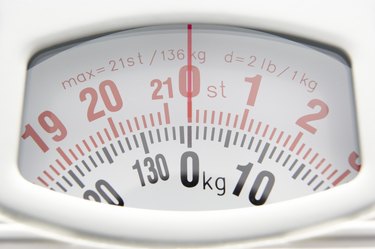
It's not uncommon to question whether your weight is normal when you're growing so rapidly during your teen years. However, the answer isn't always as simple as it might seem. Teens have different bodies that grow at different rates, which means that you and a friend could be the same height but 25 lbs. apart in weight. However, you can still find out if you are in a normal and healthy weight range for a 13 year old.
Normal Changes
Video of the Day
The body's portions of muscle, bone and fat change during puberty. Because most people don't finish puberty until their late teens, most 13 year olds should expect to gain some healthy weight over the next few years. The average person can grow as much as 10 inches during puberty before he reaches his adult height, according to the Nemours Foundation.
Video of the Day
Body Mass Index
Your doctor might use a formula called body mass index, or BMI, to determine whether you are in a healthy or unhealthy weight range. She will divide your weight in pounds by your height in inches squared -- so if you weigh 100 lbs. and you are 5 foot 3 inches tall, she would divide 100 by 3,969 -- and multiply that number by 703. In that case, your BMI would be 17.71. According to the Centers for Disease Control and Prevention's growth charts for the year 2000, the average BMI for girls in the middle of their 13th year is 18.73 and the average boys of the same age is 18.47.
Teen Weight Categories
Because teens grow at different paces, a simple BMI score wouldn't necessarily mean the same thing for you as it would for other 13 year olds. For example, you could still be in the process of growing or you might have already gone through your greatest growth spurt. Therefore, your doctor would plot your number on a growth chart for all teens of your age and sex and give you a percentile ranking based on how you compare with other teens. A BMI under the fifth percentile is considered having underweight, a BMI between the fifth and 85th percentile is considered having a healthy weight, a BMI between the 85th and 95th percentile is considered having overweight and a BMI higher than the 95th percentile is considered having obesity.
Other Weight Factors
Your BMI percentile doesn't tell the full story about your health. You might be in a higher percentile because you are muscular or have a bigger body frame. On the other hand, you might be in a low percentile but still have an unhealthy portion of body fat. Your doctor would need to perform further tests and look at factors such as your family's health history, your growth rate, your diet and your exercise levels before he diagnoses you with a weight problem.
- Paediatrics and Child Health: Dieting in Adolescence
- Centers for Disease Control and Prevention: Body Mass Index for Age Tables, Children Ages 2-20 Years?
- The Nemours Foundation: What’s the Right Weight for My Height?
- Centers for Disease Control and Prevention: About BMI for Children and Teens
- Centers for Disease Control and Prevention: About BMI for Adults